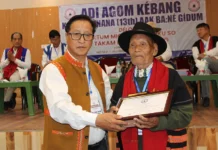NEW DELHI, 23 Sep: The Supreme Court on Monday suggested that Parliament should seriously consider bringing an amendment to the POCSO Act for substituting the term “child pornography” with “child sexual exploitative and abuse material” with a view to reflect more accurately the reality of such offences.
A bench comprising Chief Justice DY Chandrachud and Justice JB Pardiwala said that the Centre, in the meantime, may consider to bring about the suggested amendment to the POCSO Act by way of an ordinance.
“We put the courts to notice that the term ‘child pornography’ shall not be used in any judicial order or judgement, and instead the term ‘child sexual exploitative and abuse material’ (CSEAM) should be endorsed,” the bench said.
The apex court delivered a landmark judgement which held that watching and downloading child pornography are offences under the Protection of Children from Sexual Offences (POCSO) Act, 2012 and the Information Technology (IT) Act.
In its 200-page verdict, the bench suggested that implementing comprehensive sex education programmes that include information about legal and ethical ramifications of child pornography can help deter potential offenders.
“These programmes should address common misconceptions and provide young people with a clear understanding of consent and the impact of exploitation,” it said.
The top court suggested that schools can play a crucial role in early identification, intervention and implementing school-based programmes that educate students about healthy relationships, consent and appropriate behaviour and can help prevent problematic sexual behaviours (PSB).
“To give meaningful effect to the above suggestions and work out the necessary modalities, the union of India may consider constituting an expert committee tasked with devising a comprehensive programme or mechanism for health and sex education, as well as raising awareness about the POCSO among children across the country from an early age, for ensuring a robust and well-informed approach to child protection, education, and sexual wellbeing,” it said.
Suggesting that providing support services to the victims and rehabilitation programmes for the offenders is essential, the bench said that these services should include psychological counselling, therapeutic interventions and educational support to address the underlying issues and promote healthy development.
“Parliament should seriously consider to bring about an amendment to the POCSO for the purpose of substituting the term ‘child pornography’ with ‘child sexual exploitative and abuse material’ (CSEAM) with a view to reflect more accurately on the reality of such offences,” it said.
The bench said that, for those already involved in viewing or distributing child pornography, CBT (cognitive-behavioral therapy) has proven effective in addressing the cognitive distortions that fuel such behaviour.
“Therapy programmes should focus on developing empathy, understanding the harm caused to victims, and altering problematic thought patterns,” it said.
The bench suggested that raising awareness about the realities of child sexual exploitative material and its consequences through public campaigns can help reduce its prevalence and these campaigns should aim to destigmatise reporting and encourage community vigilance.
“Identifying at-risk individuals early and implementing intervention strategies for youth with problematic sexual behaviours (PSB) involves several steps and requires a coordinated effort among various stakeholders, including educators, healthcare providers, law enforcement, and child welfare services,” it said.
The bench suggested that educators, healthcare professionals and law enforcement officers should be imparted training to identify signs of PSB, and awareness programmes could help these professionals recognise early warning signs and understand how to respond appropriately. (PTI)




